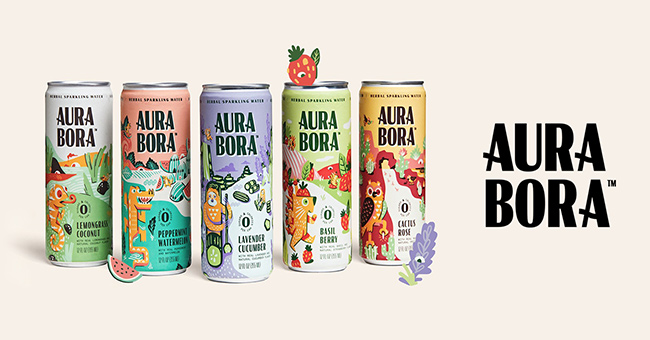
Fruit and botanical-infused sparkling water startup Aura Bora is looking to make an impression with mainstream consumers early as the San Francisco-based brand expands its sales team and takes to the conventional channel.
Since raising $2 million in a seed round this spring, Aura Bora has expanded its retail footprint to about 2,000 doors nationwide and expanded its headcount from one to nine full-time employees, co-founder and CEO Paul Voge told BevNET.
In August, the brand hired former GT’s director of retail sales Anthony Figueroa to serve as director of sales as well as regional sales managers for New York, Washington, D.C. and Northern California, tapping talent from Super Coffee, VOSS and Good Stuff Distributor. Other recent hires include director of ecommerce Cameron Faist, who previously worked at Colson Health and Buddha Teas, and business development and special projects head James Hunt, who joins from Winslow Technology Group.
“The biggest development [since the funding] was before it just kind of felt like this crazy thing I was mostly doing by myself and with my wife,” Voge said. “Now we have a company with a culture, weekly meetings where I have to share the knowledge and figure out which things on my desktop need to be in a Google Drive. So all that is to say we got very organized very fast.”
Aura Bora, which Voge co-founded with his wife Maddie last year, has emerged as a growing innovator in the sparkling water category, with Voge noting that the brand had three of the top 10 best selling single SKUs for sparkling water in the natural channel last month, per SPINS data. The company is now on pace for 7x growth in 2021 and is aiming to further expand its retail presence in the coming months.
The brand’s zero-calorie sparkling waters are made with real fruit and botanicals and are available in flavors including Peppermint Watermelon, Lemongrass Coconut, Lavender Cucumber, Basil Berry and Cactus Rose. Each 12 oz. can retails for $1.99 and the company has now introduced 6-packs to expand its presence on the dry shelf.
Aura Bora is currently available in chains including 7-Eleven, Bristol Farms, Metropolitan Market, Sprouts, Fresh Thyme, Whole Foods and has recently added Raley’s, Harris Teeter (Kroger), United Supermarket (Albertsons) and Lassens stores. With several more authorizations expected to come online in Q1 2022, Voge said the brand’s price point and differentiated positioning in the sparkling water set has allowed it to target the conventional grocery channel earlier than anticipated.
Voge added that Aura Bora now has the pull-through data to drive sales with retailers and the company has also seen strong growth on ecommerce platforms like Thrive Market, Doordash, goPuff and its own direct-to-consumer site.
“I feel like [early on] most retailers didn’t buy from me because they love lavender cucumber sparkling water, they bought from me because I was just another Subaru in their parking lot every day harassing them, and they probably thought ‘Let’s just buy this guy’s sparkling water and we can get him off our back,” he said. “Whereas as we’ve been selling for 2022 resets, we’ve had a number of times where retailers haven’t even asked for samples … they’re far more impressed with our data than they are with our product that it almost doesn’t matter.”
Aura Bora is also now turning towards a seasonal, limited edition model to test new innovations and plans to launch at least “eight or nine” new flavors next year as ecommerce exclusives. The strategy, Voge said, will drive consumer engagement and also allow the brand to trial new products. The brand saw “great response” to its first limited flavor, Ginger Meyer Lemon, earlier this year and intends to reproduce the SKU for November. Later this month, Aura Bora will debut Grapefruit Elderflower and is developing a holiday-themed drink for December.
“We’re always in this weird cycle where people like us because we’re the sparkling water company that has really cracked artisanal, bizarre, peculiar flavors,” he said. “So how do we continue to do that, where they’re peculiar in a way they want to try but not peculiar in a way they think is too strange. So if we do eight or nine next year and one or two of them were so weird that we couldn’t sell out, I’ll actually count that as a victory. That means we’re getting close enough to the line of innovation that sometimes we go over it. That’s great.”